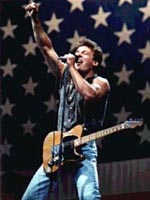
David Corn
http://www.jewishworldreview.com -- THE POSSIBLE BEATTY CANDIDACY has been keeping progressive politicos atwitter. But is a Hollywood actor-producer-director the best hope for those who call for worker-friendly and consumer-friendly—as opposed to corporate-friendly—policies and priorities? Is there no one else? Even Beatty has questioned whether he is the person best suited to lead the charge.
At a rock concert last week, I glimpsed another possibility. In the lobby of the MCI Center in Washington, there was a boy, 10 years old or so, wearing a t-shirt that read, “Springsteen for President.” If a magazine publisher or television debater or data company CEO or professional wrestler can run or consider running, why not a musician? Springsteen long has been an icon-with-substance for the working class.
In a quiet fashion, he has supported a variety of causes and do-good outfits (alternative energy, food banks, the Vietnam Veterans of America). He donated tickets to the first of his three Washington shows to World Hunger Year, an anti-hunger nonprofit, and from the stage he praised the Capital Area Community Food Bank. (“The economy is not benefiting all,” Springsteen said.) The songs he has written and performed have brought a human touch to many issues: farm policy (“Seeds”), the plight of American steelworkers (“Youngstown”), income inequality and the downside of globalization (“The Ghost of Tom Joad”), telecommunications (“57 Channels”), AIDS (“Streets of Philadelphia”), veterans affairs (“Born in the USA”), urban dislocation (“My Hometown”) and war (“War”). He also has not been reluctant to express his dismay with political leaders. Last week, he told the audience in Washington that many people are lost in confusion and bitterness—“especially here.”
Springsteen could easily reach out to various constituencies. He’d be a hit with Hispanic voters, for he participated in protests against the anti-immigrant Proposition 187 in California. Thanks to the presence of saxophonist Clarence “Big Man” Clemons, Springsteen’s E Street Band was one of the few muscle-rock groups to be racially integrated. And the Boss also boasts ideological crossover potential. Before the first Washington show, I ran into Brent Bozell, a leading hard-right activist, at the liquor store next to the arena. Don’t tell me, I said to him, that you’re a Springsteen fan. “Me and my whole family,” he answered with a smile. Don’t you know, I asked, that he stands for everything you’re against—social justice, communal values, government assistance for the less fortunate? Bozell, who spends much of his life searching for left-wing bias in the establishment media, nodded and remarked. “All my favorite musicians and actors are communists.” You may wonder how a conservative like Bozell can get juiced up by a compassionate liberal populist like Springsteen. (The Ghost of Tom Joad was a direct whack at the laissez-faire triumphalism of Newt Gingrich’s so-called Republican revolution.) But Bozell may be part of a trend.
At the same show, I encountered a television news producer I know. She was so excited she was practically shaking. “My two all-time heroes,” she explained, “are Ronald Reagan and Bruce Springsteen.” In a political sense, Springsteen is the anti-Reagan. In 1984, he responded quite angrily when Reagan, at the behest of columnist George Will, tried to appropriate “Born in the USA.” (That was a foolish move on Reagan and Will’s part, since the tune, despite its upbeat tag line, was about the alienation and bitterness of veterans who had been sent to fight a pointless war in Vietnam. In concert these days, Springsteen reclaims the song by performing it solo as he originally conceived it—a stark, haunting number with only an eerily reverbed acoustic guitar to accompany his twangy vocals. No one could mistake it for a jingoistic, patriotic anthem.) Might there be a voting bloc political scientists will one day dub “Springsteen Republicans,” a la Reagan Democrats?
 |
| Springsteen |
I admit that the Springsteen for President cause is a long shot. Springsteen has always shied away from conventional politics. As he told his Washington audience, he doesn’t endorse presidential candidates. When he came to Washington in 1995 on his solo Tom Joad tour, he turned down an offer to visit the White House of Bill Clinton. “In my opinion,” he explained at the time, “the artist has to keep his distance.” He’s self-effacing and doesn’t like to make promises he cannot keep. (“I can’t promise you life ever after,” he shouted as a mock-preacher at the MCI Center. “But I can promise you life right now.”) In an interview several years ago, he told me, “I don’t like the soapbox stuff. I don’t believe you can tell people anything. You can show them things... I don’t set out to make a point. I set out to create understanding and compassion.”
In a time when Jesse Ventura can be considered a presidential contender,
the field truly is wide open. Sure, Springsteen may not be as steeped in
policy details as Al Gore or Bill Bradley. But he is just as, if not
more, thoughtful. And aren’t his leadership and communication skills
more developed? Isn’t he more sincere? Doesn’t he empathize more with
common voters? This hardworking working-class rocker who became a
multimillionaire without any help from his father probably is too modest
to seek the presidency. But there are other options. Beatty, should he
enter the race, will need a running mate. And isn’t there an open Senate
seat in New Jersey? After all, that’s a state with a history of electing
to office someone who performs well in basketball arenas. Springsteen
might be more born-to-run than he ever
JWR contributor David Corn, Washington Editor of The
Nation, writes the "Loyal Opposition" column for The New York Press.


